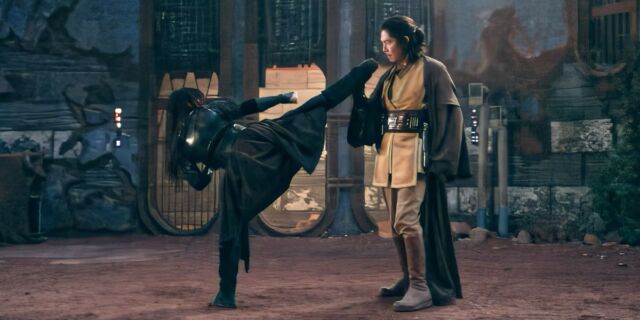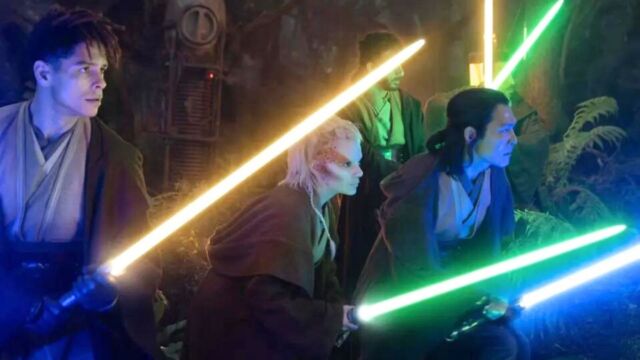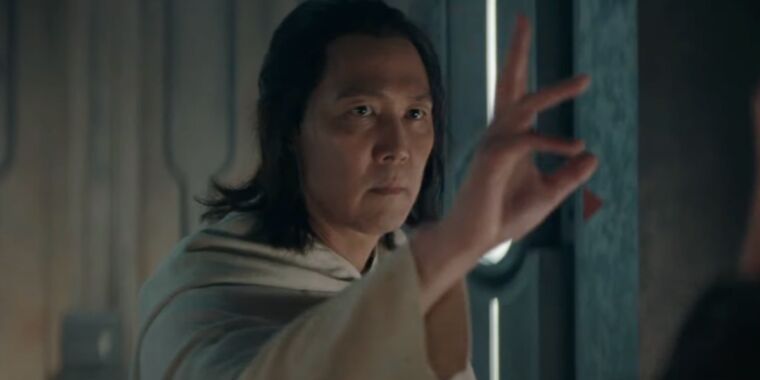YouTube/Disney+
In news that will delight some and disappoint others, Disney has canceled Star Wars series The Acolyte after just one season, Deadline Hollywood reports. The eight-episode series got off to a fairly strong start, with mostly positive reviews and solid ratings, albeit lower than prior Star Wars series. But it couldn’t maintain and build upon that early momentum, and given the production costs, it’s not especially surprising that Disney pulled the plug.
The Acolyte arguably wrapped up its major narrative arc pretty neatly in the season finale, but it also took pains to set the stage for a possible sophomore season. In this streaming age, no series is ever guaranteed renewal. Still, it would have been nice to see what showrunner Leslye Headland had planned; when given the chance, many shows hit their stride on those second-season outings.
(Spoilers for the series below. We’ll give you another heads-up when we get to major spoilers.)
As I’ve written previously, The Acolyte is set at the end of the High Republic Era, about a century before the events of The Phantom Menace. In this period, the Jedi aren’t the underdog rebels battling the evil Galactic Empire. They are at the height of their power and represent the dominant mainstream institution—not necessarily a benevolent one, depending on one’s perspective. That’s a significant departure from most Star Wars media and perhaps one reason why the show was so divisive among fans. (The show had its issues, but I dismiss the profoundly unserious lamentations of those who objected to the female-centric storyline and presence of people of color by dubbing it “The Wokelyte” and launching a review-bombing campaign.)
The Acolyte opened on the planet Ueda, where a mysterious masked woman wielding daggers attacked Jedi Master Indara (Carrie-Anne Moss) and killed her. The assassin was quickly identified as Osha Aniseya (Amandla Stenberg), a former padawan now working as a meknek, making repairs on spaceships. Osha was arrested by her former classmate, Yord Fandar (Charlie Barnett), but claimed she was innocent. Her twin sister, Mae, died in a fire on their home planet of Brendok when they were both young. Osha concluded that Mae was still alive and had killed Indara. Osha’s former Jedi master, Sol (Lee Jung-jae), believed her, and subsequent events proved Osha right.
Mae’s targets were not random. She was out to kill the four Jedi she blamed for the fire on Brendok: Indara, Sol, Torbin (Dean-Charles Chapman), and a Jedi Wookiee named Kelnacca (Joonas Suotamo). The quartet had arrived on Brendok to demand they be allowed to test the twins as potential Jedi.
The twins had been raised by a coven of “Force witches” there, led by Mother Aniseya (Jodie Turner-Smith), who believed the Jedi were misusing the Force. While Mae was keen to follow in their mother’s footsteps, Osha wanted to train with the Jedi. When the fire broke out, both Mae and Osha believed the other twin had been killed along with the rest of the coven. How the fire really started, and the identity of Mae’s mysterious Master who trained her in the dark side of the Force, were the primary mysteries that played out over the course of the season.
(WARNING: Major spoilers below. Stop reading now if you haven’t finished watching the series.)
Lightsabers and wuxia

Lucasfilm/Disney+
From the start, The Acolyte was a bit of a departure from a typical Star Wars series, weaving in elements from wuxia films and detective stories while remaining true to the established Star Wars aesthetic and design. That alone made it an intriguing effort, with fresh characters and new takes on classic Star Wars lore. And the martial arts-inspired fight choreography was clever and fun to watch—especially in the shocking, action-packed fifth episode (“Night”).
But there were some obvious shortcomings as well, most notably the clunky dialogue—although that’s kind of a long-standing attribute of the Star Wars franchise. (Alec Guinness notoriously hated his dialogue as Obi-Wan Kenobi in A New Hope.) The pacing lagged at times, and there was a surprisingly high body count among the central characters.

Lucasfilm/Disney+
That alone might have made a second season challenging. I mean, they killed off Moss’ Jedi master in the first 10 minutes (although she reappeared in flashbacks), with Torbin and Kelnacca meeting the same fate over the next few episodes. By the time the final credits rolled, almost all the Jedi lead characters were dead. And senior leader Vernestra (Rebecca Henderson) opted to blame the murders on Sol (RIP) rather than Mae’s master, who turned out to be Vernestra’s former apprentice, Qimir (a scene-stealing Manny Jacinto)—now apprentice to Sith lord Darth Plagueis. (This was strongly implied in the finale and subsequently confirmed by Headland.)
Ultimately, however, it all came down to the ratings. Per Deadline, The Acolyte garnered 11.1 million views over its first five days (and 488 million minutes viewed)—not bad, but below Ahsoka‘s 14 million views over the same period. But those numbers declined sharply over the ensuing weeks, with the finale earning the dubious distinction of posting the lowest minutes viewed (335 million) for any Star Wars series finale. That simply didn’t meet Disney’s threshold for renewal, so we won’t get to learn more about the Qimir/Darth Plagueis connection.
